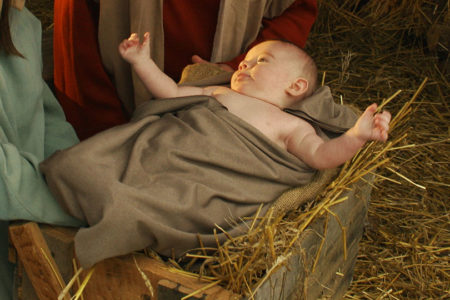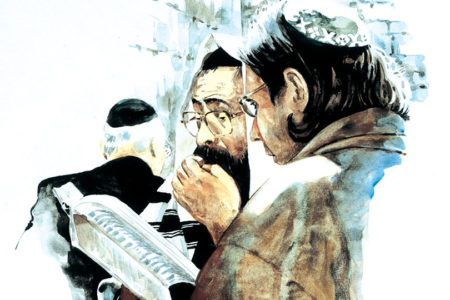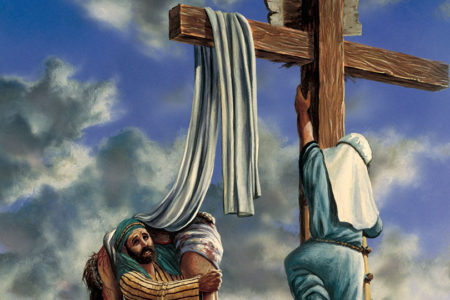The Messiah’s Reign
At times I become perplexed with the words of a favorite Christmas carol. They make me wonder what the author really intended.
No more let sins and sorrows grow,
Nor thorns infest the ground;
He comes to make His blessings flow
far as the curse is found.
He rules the world with truth and grace,
and makes the nations prove
The glories of His righteousness,
and wonders of His love.
In this well-known carol, “Joy to the World,” Isaac Watts expressed the thrill of the Messiah’s birth by describing events that just don’t seem to exist. I still weed garden beds and prick myself on thorns. The curse has not been lifted. The nations of the world have no desire to prove God’s righteousness and revel in His love. Jesus has come, but things are not as good as the song suggests—yet.
Promises of the Messiah’s Reign
In the earliest time period described in the Bible, God planned to provide someone who would right the wrongs of this world. The serpent tempted Adam and Eve. They fell into sin. The world and all its creatures fell under the curse of corruption and sin, and Satan thought he had won a victory. But at that very time, God pronounced the Devil’s doom: “And I will put enmity between thee and the woman, and between thy seed and her seed; he shall bruise thy head, and thou shalt bruise his heel” (Gen. 3:15). This is the first mention of the gospel. God promised to provide a male from the chosen line of His people who would destroy the tempter. Although brief and compact, this verse contains all the seeds that unfold in the rest of divine history.
Another promise shines brightly from the first book of the Old Testament. Jacob pronounced these prophetic words: “The scepter shall not depart from Judah, nor a lawgiver from between his feet, until Shiloh come; and unto him shall the gathering of the people be” (Gen. 49:10). This text narrows the source of the Messiah’s lineage to the tribe of Judah. It also describes two important aspects of His work. First, Shiloh (either a title for the Messiah or a description of Him as “the one to whom the scepter belongs”) will have a scepter, the mark of a king. Second, all the peoples of the world will obey this king. Not only will this man crush Satan, He will also receive the worship of the nations.
The most important prediction of this coming king is known as the Davidic Covenant. In 2 Samuel 7, God promised David that one of his descendants would rule an eternal kingdom: “thine house and thy kingdom shall be established forever before thee; thy throne shall be established forever” (2 Sam. 7:16). From this point in history onward, the Jewish prophets and people based their Messianic hope on a future descendant of David. The Prophet Micah even pinpointed the town of the future king’s birth—Bethlehem, David’s hometown (Mic. 5:2).
Descriptions of the Messiah’s Reign
God’s prophets foresaw the promised Messiah and described His coming kingdom as a period of remarkable blessings. Daniel prophesied that during the last earthly empire, “the God of heaven [will] set up a kingdom, which shall never be destroyed” (Dan. 2:44). Following are the major elements of the prophets’ promises.
A Restored Peace
The Messiah will begin His rule by judging and purging evil from His earth (Joel 3:1–17). He will establish His earthly throne on Mount Zion in Jerusalem and will rule the nations with a rod of iron (Ps. 2:6, 9). Implements of war will be recycled into constructive tools (Isa. 2:4). Isaiah described the Prince of Peace, of whose “government and peace there shall be no end” (9:7). The Prince of Peace is the Messiah, the son of David. “And in that day there shall be a root of Jesse, who shall stand for an ensign of the peoples; to him shall the nations seek, and his rest shall be glorious” (Isa. 11:10). Zechariah predicted, “Rejoice greatly, O daughter of…Jerusalem…thy King cometh unto thee; he is just, and having salvation; lowly, and riding upon an ass…he shall speak peace unto the nations; and his dominion shall be from sea even to sea” (9:9–10).
A Regenerated Israel
The Jewish remnant that will survive until the end of the future Tribulation period will repent and trust in the Messiah. As the prophet said, “they shall look upon me whom they have pierced, and they shall mourn for him” (Zech. 12:10). Israel will then become what God intended from the time of Moses—the head of the nations (Dt. 28:13). The Jewish people will enjoy the fulfillment of the New Covenant (Jer. 31:31–34). With new hearts, they will obey their Lord. With God’s own Spirit directing them (Ezek. 36:24–27), Israel will delight in the rule of its Messianic King. Israel will walk with its God in its own land, regathered by the Almighty, as guaranteed in the ancient promises made to Abraham (Gen. 15:18–21).
A Revived Worship
With true peace on earth, Israel will lead the nations in submission to the Messiah. Central to the worship of this magnificent period is God’s Temple. Ezekiel described it in great detail (chs. 40–48). Located in Jerusalem, this Temple will be the place where “many nations shall come, and say, Come, and let us go up to the mountain of the Lord, and to the house of the God of Jacob; and he will teach us of his ways, and we will walk in his paths” (Mic. 4:2). The Messiah, as both King and Priest in the order of Melchizedek (Ps. 110), will rule and distribute God’s blessings. As Daniel prophesied, “there was given him [the Messiah] dominion, and glory, and a kingdom, that all people, nations, and languages should serve him” (Dan. 7:14). What a difference it will be when “the earth shall be full of the knowledge of the Lord, as the waters cover the sea” (Isa. 11:9).
A Renewed Earth
When the serpent brought sin into the world, God cursed the ground. When the Messiah reigns on the earth, God’s curse will be lifted. The word fertility best describes this transformed world. God will “raise up the tabernacle of David that is fallen” (a reference to the Messiah) and “the plowman shall overtake the reaper” (Amos 9:11, 13). Both plants and animals will produce abundantly. Animals that are now natural enemies will be close friends (Isa. 11:6–9). The Messiah’s kingdom will see almost total reversal of the curse and a return to the Garden of Eden (Ezek. 36:35). Although still present, sin and death will be greatly suppressed (Isa. 65:20; Zech. 14:17–19).
Realization of the Messiah’s Reign
At Jesus’ First Coming
With such wonderful promises of the future described in the Old Testament, generations of Jewish believers wondered when the Messiah would come and establish His kingdom. Hundreds of years after the prophets spoke, the angel Gabriel finally announced, “the Lord God shall give unto him the throne of his father, David. And he shall reign over the house of Jacob forever; and of his kingdom there shall be no end” (Lk. 1:32–33). The long-awaited fulfillment of the covenant with David had arrived. The King had come! Joy to the world!
At the proper time, Jesus announced His message: “Repent; for the kingdom of heaven is at hand” (Mt. 4:17). The kingdom promised by the prophets was near. However, instead of obeying their King, the Jewish leaders refused to repent. Most of the Jewish people misunderstood their need for repentance and desired only the kingdom’s physical and material blessings. The Jewish nation rejected their King and the kingdom He had announced.
But there were some who listened. Jesus taught these disciples that when He returned again, His kingdom would have a new form unknown to the Old Testament prophets. Until His return, the spiritual blessings of that future kingdom would be available to all who would believe. He taught these kingdom truths in parables (Mt. 13:1–52; 18:23–35; 20:1–16). The Apostle Paul mentioned blessings of the kingdom that believers presently enjoy (Rom. 14:17; Col. 1:13–14). In a similar way, New Covenant spiritual blessings are available to believers in the church age (1 Cor. 11:25; Heb. 8:6–13; 9:15). But Israel will experience New Covenant blessings in full when Jesus returns in the kingdom age (Rom. 11:2).
At Jesus’ Second Coming
After His resurrection, Jesus taught the apostles about the kingdom of God. They no doubt had heard Jesus explain the Old Testament prophecies. They knew it was yet future because Jesus had taught them to pray, “Thy kingdom come” (Mt. 6:10). But they were not certain when it would come, so they asked Jesus if He would “at this time restore again the kingdom to Israel” (Acts 1:6). He replied that only the Father knows the timing of the kingdom’s arrival. Soon after this, Peter preached that when Jesus returns, God will institute “the times of restitution of all things, which God hath spoken by the mouth of all his holy prophets” (Acts 3:21). Jesus and His apostles believed in a yet-future kingdom as described by the Old Testament prophets.
It is important to realize that not all Christians believe in a future kingdom for Israel. Some teach that the church has replaced Israel in the plan of God. They propose that since Israel rejected God’s Messiah, God rejected Israel and has assembled a new Israel. This “replacement theology” has deep roots in history but shallow roots in Scripture. Christians should be aware of this teaching and beware of displacing Israel in God’s plans. “Be not high-minded, but fear…as touching the election, they are beloved for the fathers’ sakes” (Rom. 11:20, 28).
The Messiah will break into human history after He has poured out His wrath for a period of seven years. As John said, “I saw heaven opened and, behold, a white horse; and he that sat upon him was called Faithful and True, and in righteousness he doth judge and make war…And he hath on his vesture and on his thigh a name written, king of kings, and lord of lords” (Rev. 19:11, 16). This King will begin His earthly reign by judging the nations (Mt. 25:31–46). This act will allow only believing Gentiles into the kingdom, along with all Israel who will be saved (Rom. 11:26).
The earthly reign of the Messiah Jesus will last one thousand years (Rev. 20). All four elements discussed (a restored peace, a regenerated Israel, a revived worship, and a renewed earth) will be present in His reign. It is surprising to realize that believers in Jesus will also share in His earthly rule. The Scriptures are quite clear that “the kingdom…shall be given to the people of the saints of the Most High” (Dan. 7:27). This co-regency is summarized in Rev. 20:4: “they lived and reigned with Christ a thousand years” (see also 1 Cor. 6:1–3; 2 Tim. 2:12; Rev. 5:10).
At the end of this period, Satan will lead a rebellion among those born to Tribulation believers who entered the kingdom in their natural bodies. Jesus will judge the mastermind of evil by casting him into the lake of fire. The King will then sit on the Great White Throne to condemn all unbelievers to the same place of eternal torment (Rev. 20:7–15). “For he must reign, till he hath put all enemies under his feet. The last enemy that shall be destroyed is death” (1 Cor. 15:25–26). The Messianic Kingdom will conclude “when he shall have delivered up the kingdom to God, even the Father” (1 Cor. 15:24).
“Joy to the world! The Lord is come!” And He will come again to reign!







Can we say that the reign with Christ a thousand years maybe our present time; before He come again for the second time .
no we cannot say that. scriptures are clear that Jesus’ rule must include the saints taking over worldly kingdoms at the same time as the resurrection occurs.
The events of Rev 20 & 21 are in chronological order. Christ reigns with the martyrs only. They are the first resurrection, 1 Cor 15:23 and Rev 20:4-6. THIS earth doesn’t flee away until after the 1,000 years are finished, Rev 20:7 & 11. And the wheat are the flesh and blood people who are alive and remaining at the end of His kingdom and end of the world, Matt 13:38-39. The dead rise, Death is cast into the fire, and the wheat will be raptured up to the kingdom of God “who brings the dead in Jesus”, 1 Thess 4:14.
You said that Christ reigns with the Martyrs only. That is incorrect. All dead Saints must be resurrected the same time, whether they were Martyrs or not. It is the same Resurrection and all who are resurrected will be in that rule.
Thanks Bill!! Praise God for the future hope we have of the reign of the Messiah, our Lord Jesus Christ!
yes I agree it is a very sound (but incomplete) explanation of the fate of Israel. .. but please allow me to challenge you and Bro. Krewsom into further Truth.
please read Eze 37 again with an open mind and you will see what God has hiding in plain sight that a future resurrection of Dead Hopeless Israel MUST occur. but the only time this can happen is AFTER the 1000 years …
here is a theology that shatters the present doctrine that there is No Future Salvation for the Dead masses of humanity nor dead Israel. I’m willing to show you all the evidence you overlooked. remember Jonah? learn a lesson from the book. God bless your studies.
Chris